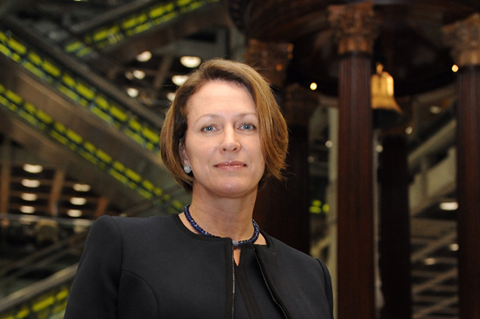Inga Beale explains how Lloyd’s is researching the best steps for the industry to maintain relevance

In a time when most industry insurtech innovators are opting for an agile approach to change, Lloyd’s is notably taking its time to get things right. But the need for speed and, at the very least, for keeping abreast of what impact outside forces are having on the industry are not lost on Lloyd’s chief executive Dame Inga Beale. Speaking with Global Reinsurance editor Samera Owusu Tutu, Beale outlines the changes the industry needs to make to maintain relevance, and the steps Lloyd’s is making to achieve this.
It’s impossible to talk about change at Lloyd’s without addressing the modernisation of its operating systems and processes. The Lloyd’s Target Operating Model (TOM) has been in the works since 2015, when it was agreed by the London Market Group and Lloyd’s Franchise Board.
Among other things, TOM provides global data standards. Its purpose is to be a platform for electronic processing that standardises transactions, effectively bringing markets around the globe closer together.
“People should be able to track the placement of their risk; they should be able to track their claim, and how it’s progressing through the system. That’s the vision,” explains Beale.
Taking on new ways of working in many cases means a change in culture. Beale points out that one of the most prevalent fixtures in both established and burgeoning markets is bureaucratic and paper-based processes.
“Throughout the world, there is actually a lot of bureaucracy and paper-based processes.”
Beale flagged unlikely mature market Australia as “one of the most technologically advanced insurance markets” in the world, highlighting that it was one of the first markets to have automated underwriting, with only certain risks requiring an underwriter to provide individual attention. Many emerging markets, however, where not seizing the opportunity to leapfrog tradition and move into technological processes.
“I thought that the culture might be different in some of these new markets and that we might be able to learn from them, but they seem to have taken on some of the older habits.”
Beale is clear on her view of the negative impact protectionism can have on a country, as well as global markets.
There are several components to consider when assessing why some newer markets have opted for traditional ways of working within the industry.
Beale stresses that when it comes to engaging with modernisation through innovation, there is more at stake than just the uptake of new technology: it’s about global synergy.
While even China, renowned for its inward facing approach is now opening its borders to international trade, there are still countries that lean towards protectionism. Indonesia is an example of this, though Beale points out that protectionism is becoming more prevalent in some more established markets also.
“Take a country like Germany; it has introduced a rule where reinsurers are not even able to [operate in] Germany unless they had a European base, or some sort of authorised office.”
Beale is clear on her view of the negative impact protectionism can have on a country, as well as global markets.
“For countries that have high catastrophe exposures and other difficult exposures, if you don’t encourage cross-border activity, and you don’t allow diversification on a global basis, you end up with a concentration of risk that doesn’t benefit anyone. The government and tax payers usually have to foot the bill within the country.”
“We see Saudi Arabia as being an important growth market in the future, and also North Africa.”
With this global market view, Lloyd’s is reacting to a changing world in a number of ways – its expansion into emerging markets is one of them. The Pied Piper of insurance, where Lloyd’s goes others follow as its focus on an emerging region is a rubber stamp that there are viable opportunities to seize there. After launching in Dubai in 2015, Lloyd’s saw a 30% growth in this region in 2016.
“When we started in Singapore nearly 16 years ago, we only had 2 syndicates there; we’ve now got 23. We started in Dubai only 2 years ago and we already have 11.”
Beale adds: “We see Saudi Arabia as being an important growth market in the future, and also North Africa.”
With the majority of the region’s activity still happening out of London however, Beale stresses it’s about the end game.
“The world is changing and Lloyd’s is reacting much more quickly to the changing world. We write $600m of business in the region, $90m of it from Dubai. The bulk of it is still written out of London - but this will start to change, and what we want to be clear of is that we are looking at the medium to long term strategy and this is all about the long-term game.”
Full interview in the Global Reinsurance magazine - Summer 2017 edition. Download here







No comments yet